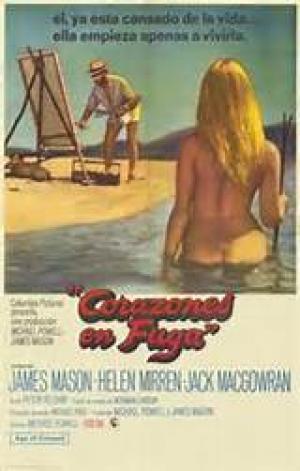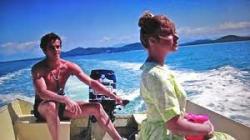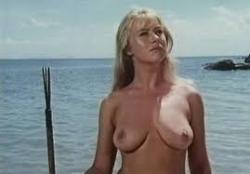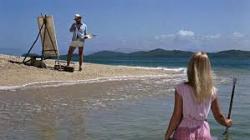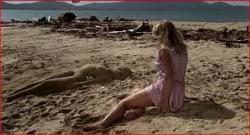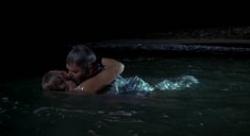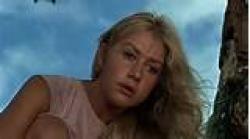Michael Powell's final canvas
By Michael Roberts
In one of the more unexpected and odd quirks of film history, the now widely lauded British director Michael Powell finished his career as a feature director in Australia, having become unemployable elsewhere after the scandal of his early 1960’s film Peeping Tom. The ill-fitting, fish-out-of-water tale of an Italian immigrant struggling to assimilate into the then crudely macho Australian culture was the subject of They’re a Weird Mob in 1965, but he found something far more suited to his idiosyncratic talents in Norman Lindsay’s once scandalous novel, Age of Consent.
Brad Monahan is a famous and successful Australian artist, having gallery showings and bedding art groupies at will, but in a crisis of confidence he decides to find an island idyll to reconnect with his muse, far away from the urban pace and traps that have sapped his creativity. En route, he encounters a sycophant called Nat who enjoys a good time on Brad’s largesse, but soon Brad drops him and gets away to his North Queensland haven. In this tropical paradise, he encounters Cora (Helen Mirren) a free spirited local girl and his interaction with her slowly thaws his icy demeanour.
Brad is a man in stasis, frozen into place by the anaesthetising drip of acclaim and numbed by success, hating humanity for their commercial embrace of his work. Brad despises the city, the people in it and longs to find a retreat and focus on his work for himself, not for the adorning of middle class snobs walls as bourgeois status symbols. Brad forsakes people for a dog as his companion and takes a boat across the beautiful Barrier Reef. The sparsely populated island that Brad settles on is largely uninhabited, but his state of mind reveals itself when he sees a second person in as many days and remarks to his trusty dog, "Like I said, this place is crawling with people"!
Powell luxuriates in the riot of colour available to him in the Great Barrier Reef setting, affording him wide scope in the outdoor environment and reminding us of his mastery of the colour palette. Powell had pushed the use of colour in his previous ‘theatrical’ triumphs, The Red Shoes and Tales of Hoffman, into areas of rare expression, in many ways his mise-en-scène taking on painterly dimensions. The themes of an artist in crisis, having his energies revived by a young woman may have been an idea close to his heart; certainly, his whole life was in service to the arts, Powell being an early champion of fusing music, theatre, dance and literature into his personal cinema. The incremental renovation of the decrepit beach house into a riot of colour and artistic expression is a metaphor for the renovation of Brad, a man beaten down by other elements and in need of attention.
Mason and Powell had long expressed the wish to work together, and couldn't come to terms on I Know Where I'm Going as far back as 1944 with issues of billing and location shooting getting in the way. Here they share a co-producers credit, teaming up with local actor Michael pate, who'd acquired the rights to Lindsay's novel some years prior. Mason proves a reasonable hand at the difficult Australian accent, and manages a convincing portrait of a man in existential crisis, but Mirren shines as Cora, effortlessly providing the requisite innocence and feral guile. Renowned Tasmanian musician Peter Sculthorpe provides the serviceable soundtrack, only the muzak like vocal theme badly dates the piece, and novelist Peter Yeldham adapted Lindsay’s controversial novel.
Powell explored the world of the young woman as 'wild child of nature' in the vastly under-rated Gone to Earth in 1950, his and his then partner Emeric Pressburger’s difficult co-production with David O Selznick. The sensuous element of a sexual awakening amidst a stunning natural backdrop is replicated here, with Helen Mirren taking the Jennifer Jones role and the tropical north of Australia filling in for the rolling woods of Shropshire. The only problem with Age of Consent is the uneven tone, the broad comedy of Jack MacGowran hitting some discordant notes against the struggle of an artist regaining his muse, and the grotesquery of the old lady also jars, an issue acknowledged by Powell in latter years. The film manages however to still pay off nicely, as Brad thaws sufficiently to recognise the depth of his feelings for Cora, embracing her passionately and declaring, "You've given me back my eyes".
Brad condemns the art racketeers, selling his work to people who have a "blind faith in what they don't understand", and in a way, it encapsulates Powell's dilemma in working in film. Powell walked a tightrope between pure auteurism, and taking into account the business of selling his films to an audience. In the last 20 years of he life he was unable to have another major feature produced, but never gave up trying, a man of art to the last.
Age of Consent is an odd fish, a time capsule of an Australia that is mostly a distant memory, one of a boorish, masculine culture dominated by a frontier mentality mixed with a cultural inferiority complex. That Michael Powell found himself working his particular tropes in this environment and managing to keep most of the elements in harmony is no small thing, and even if the film remains an overlooked Powell achievement, it's still well worth checking out.
